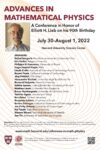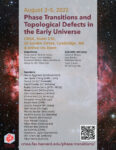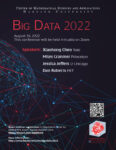July | 1 - CONFERENCE: Advances in Mathematical Physics: A Conference in Honor of Elliott H. Lieb on his 90th Birthday.
All day August 1, 2022-August 1, 2022  Advances in Mathematical Physics A Conference in Honor of Elliott H. Lieb on his 90th Birthday Dates: July 30-August 1, 2022 Harvard University July 30 – 31, 2022: Hall B, Science Center, 1 Oxford Street, Cambridge, MA, 02138
August 1, 2022: Hall C, Science Center, 1 Oxford Street, Cambridge, MA, 02138 Register Here Conference Schedule Download PDF for a detailed schedule of lectures and events. Saturday, July 30, Hall B | Sunday, July 31, Hall B | Monday, August 1, Hall C |
|---|
8:45 a.m. – 9 a.m. Refreshments | 8:45 a.m. – 9 a.m. Refreshments | 8:45 a.m. – 9 a.m. Refreshments | 9 a.m. – 9:45 a.m. Jan Philip Solovej | 9 a.m. – 10 a.m. Hugo Duminil-Copin | 9 a.m. – 9:45 a.m. Yoshiko Ogata | 9:45 a.m. – 10:30 a.m. László Erdös | 10 a.m. – 10:30 a.m. Tea Break | 9:45 a.m. – 10:30 a.m. Hal Tasaki | 10:30 a.m. – 11 a.m. Tea Break | 10:30 a.m. – 11:15 a.m. Jürg Fröhlich | 10:30 a.m. – 11 a.m. Tea Break | 11 a.m. – 11:45 a.m. Robert Seiringer | 11:15 a.m. – 12 p.m. Bertrand Halperin | 11 a.m. – 11:45 a.m. Bruno Nachtergaele | 11:45 a.m. – 12:30 p.m. Rupert Frank | 12:00 p.m. – 1:30 p.m. Lunch | 11:45 a.m. – 12:30 p.m. Alessandro Guiliani | 12:30 p.m. – 2 p.m. Lunch | 1:30 p.m. – 2:15 p.m. Jun Yin | 12:30 p.m. – 2 p.m. Lunch | 2 p.m. – 2:45 p.m. Simone Warzel | 2:15 p.m. – 3 p.m. Sabine Jansen | 2 p.m. – 2:45 p.m. Ron Peled | 2:45 p.m. – 3:30 p.m. Benjamin Schlein | 3 p.m. – 3:30 p.m. Tea Break | 2:45 p.m. – 3:30 p.m. Mathieu Lewin | 3:30 p.m. – 4 p.m. Tea Break | 3:30 p.m. – 4:30 p.m. A Review of Lieb’s Work | 3:30 p.m. – 4 p.m. Tea Break | 4 p.m. – 4:45 p.m. Rafael Benguria | | 4 p.m. – 4:45 p.m. Eric Carlen |
Organizers:
Michael Aizenman, Princeton University
Joel Lebowitz, Rutgers University
Ruedi Seiler, Technische Universität Berlin
Herbert Spohn, Technical University of Munich
Horng-Tzer Yau, Harvard University
Shing-Tung Yau, Harvard University
Jakob Yngvason, University of Vienna Speakers:
Rafael Benguria, Pontificia Universidad Catolica de Chile
Eric Carlen, Rutgers University
Philippe Di Francesco, University of Illinois
Hugo Duminil-Copin, IHES
László Erdös, Institute of Science and Technology Austria
Rupert Frank, The California Institute of Technology
Jürg Fröhlich, ETH Zurich
Alessandro Giuliani, Università degli Studi Roma Tre
Bertrand Halperin, Harvard University
Klaus Hepp, Institute for Theoretical Physics, ETH Zurich
Sabine Jansen, Ludwig Maximilian University of Munich
Mathieu Lewin, Université Paris-Dauphine
Bruno Nachtergaele, The University of California, Davis
Yoshiko Ogata, University of Tokyo
Ron Peled, Tel Aviv University
Benjamin Schlein, University of Zurich
Robert Seiringer, Institute of Science and Technology Austria
Jan Philip Solovej, University of Copenhagen
Hal Tasaki, Gakushuin University
Simone Warzel, Technical University of Munich
Jun Yin, The University of California, Los Angeles
| 2 - CMSA EVENT: CMSA Workshop on Phase Transitions and Topological Defects in the Early Universe
All day August 2, 2022-August 5, 2022 1 Oxford Street, Cambridge, MA 02138 USA  Zoom registration is required to receive the webinar link. In-person registration is at capacity. If you are interested in attending please contact: Pouya AsadiOrganizers: Pouya Asadi, Nick DePorzio, Katie Fraser, Sam Homiller, Rashmish Mishra, Marianne Moore, Aditya Parikh, Yitian Sun Scientific Advisory: Julian B. Muñoz, Lisa Randall, Matthew Reece, Tracy Slatyer, Shing-Tung Yau Schedule/Format
There will be 20+10 min talks, ample discussion time, and lightning chalkboard talks. Speakers: - Nancy Aggarwal (Northwestern)
- Jae Hyeok Chang (UMD – JHU)
- Yanou Cui (UC Riverside)
- David Dunsky (UC Berkeley)
- Isabel Garcia-Garcia (KITP – UCSB)
- Oliver Gould (Nottingham)
- Yann Gouttenoire (Tel-Aviv)
- Eleanor Hall (UC Berkeley)
- Sungwoo Hong (Chicago)
- Anson Hook (UMD)
- Jessica Howard (UC Irvine)
- Mrunal Korwar (Wisconsin)
- Soubhik Kumar (UC Berkeley)
- Vuk Mandic (Minnesota)
- Yuto Minami (Osaka)
- Adam Moss (Nottingham)
- Michael Nee (Oxford)
- Kai Schmitz (CERN)
- Stephen R. Taylor (Vanderbilt University)
- Ofri Telem (UC Berkeley)
- Yikun Wang (Caltech)
- Seth Koren (Chicago)
- Yikun Wang (Caltech)
| 3 - CMSA EVENT: CMSA Workshop on Phase Transitions and Topological Defects in the Early Universe
All day August 3, 2022-August 5, 2022 1 Oxford Street, Cambridge, MA 02138 USA  Zoom registration is required to receive the webinar link. In-person registration is at capacity. If you are interested in attending please contact: Pouya AsadiOrganizers: Pouya Asadi, Nick DePorzio, Katie Fraser, Sam Homiller, Rashmish Mishra, Marianne Moore, Aditya Parikh, Yitian Sun Scientific Advisory: Julian B. Muñoz, Lisa Randall, Matthew Reece, Tracy Slatyer, Shing-Tung Yau Schedule/Format
There will be 20+10 min talks, ample discussion time, and lightning chalkboard talks. Speakers: - Nancy Aggarwal (Northwestern)
- Jae Hyeok Chang (UMD – JHU)
- Yanou Cui (UC Riverside)
- David Dunsky (UC Berkeley)
- Isabel Garcia-Garcia (KITP – UCSB)
- Oliver Gould (Nottingham)
- Yann Gouttenoire (Tel-Aviv)
- Eleanor Hall (UC Berkeley)
- Sungwoo Hong (Chicago)
- Anson Hook (UMD)
- Jessica Howard (UC Irvine)
- Mrunal Korwar (Wisconsin)
- Soubhik Kumar (UC Berkeley)
- Vuk Mandic (Minnesota)
- Yuto Minami (Osaka)
- Adam Moss (Nottingham)
- Michael Nee (Oxford)
- Kai Schmitz (CERN)
- Stephen R. Taylor (Vanderbilt University)
- Ofri Telem (UC Berkeley)
- Yikun Wang (Caltech)
- Seth Koren (Chicago)
- Yikun Wang (Caltech)
| 4 - CMSA EVENT: CMSA Workshop on Phase Transitions and Topological Defects in the Early Universe
All day August 4, 2022-August 5, 2022 1 Oxford Street, Cambridge, MA 02138 USA  Zoom registration is required to receive the webinar link. In-person registration is at capacity. If you are interested in attending please contact: Pouya AsadiOrganizers: Pouya Asadi, Nick DePorzio, Katie Fraser, Sam Homiller, Rashmish Mishra, Marianne Moore, Aditya Parikh, Yitian Sun Scientific Advisory: Julian B. Muñoz, Lisa Randall, Matthew Reece, Tracy Slatyer, Shing-Tung Yau Schedule/Format
There will be 20+10 min talks, ample discussion time, and lightning chalkboard talks. Speakers: - Nancy Aggarwal (Northwestern)
- Jae Hyeok Chang (UMD – JHU)
- Yanou Cui (UC Riverside)
- David Dunsky (UC Berkeley)
- Isabel Garcia-Garcia (KITP – UCSB)
- Oliver Gould (Nottingham)
- Yann Gouttenoire (Tel-Aviv)
- Eleanor Hall (UC Berkeley)
- Sungwoo Hong (Chicago)
- Anson Hook (UMD)
- Jessica Howard (UC Irvine)
- Mrunal Korwar (Wisconsin)
- Soubhik Kumar (UC Berkeley)
- Vuk Mandic (Minnesota)
- Yuto Minami (Osaka)
- Adam Moss (Nottingham)
- Michael Nee (Oxford)
- Kai Schmitz (CERN)
- Stephen R. Taylor (Vanderbilt University)
- Ofri Telem (UC Berkeley)
- Yikun Wang (Caltech)
- Seth Koren (Chicago)
- Yikun Wang (Caltech)
| 5 - CMSA EVENT: CMSA Workshop on Phase Transitions and Topological Defects in the Early Universe
All day August 5, 2022-August 5, 2022 1 Oxford Street, Cambridge, MA 02138 USA  Zoom registration is required to receive the webinar link. In-person registration is at capacity. If you are interested in attending please contact: Pouya AsadiOrganizers: Pouya Asadi, Nick DePorzio, Katie Fraser, Sam Homiller, Rashmish Mishra, Marianne Moore, Aditya Parikh, Yitian Sun Scientific Advisory: Julian B. Muñoz, Lisa Randall, Matthew Reece, Tracy Slatyer, Shing-Tung Yau Schedule/Format
There will be 20+10 min talks, ample discussion time, and lightning chalkboard talks. Speakers: - Nancy Aggarwal (Northwestern)
- Jae Hyeok Chang (UMD – JHU)
- Yanou Cui (UC Riverside)
- David Dunsky (UC Berkeley)
- Isabel Garcia-Garcia (KITP – UCSB)
- Oliver Gould (Nottingham)
- Yann Gouttenoire (Tel-Aviv)
- Eleanor Hall (UC Berkeley)
- Sungwoo Hong (Chicago)
- Anson Hook (UMD)
- Jessica Howard (UC Irvine)
- Mrunal Korwar (Wisconsin)
- Soubhik Kumar (UC Berkeley)
- Vuk Mandic (Minnesota)
- Yuto Minami (Osaka)
- Adam Moss (Nottingham)
- Michael Nee (Oxford)
- Kai Schmitz (CERN)
- Stephen R. Taylor (Vanderbilt University)
- Ofri Telem (UC Berkeley)
- Yikun Wang (Caltech)
- Seth Koren (Chicago)
- Yikun Wang (Caltech)
| 6 |
7 | 8 | 9 | 10 - CMSA EVENT: CMSA Interdisciplinary Science Seminar: Recent Advances on Maximum Flows and Minimum-Cost Flows
Speaker: Yang P. Liu – Stanford University 9:00 AM-10:00 AM August 10, 2022 1 Oxford Street, Cambridge, MA 02138 USA
Abstract: We survey recent advances on computing flows in graphs, culminating in an almost linear time algorithm for solving minimum-cost flow and several other problems to high accuracy on directed graphs. Along the way, we will discuss intuitions from linear programming, graph theory, and data structures that influence these works, and the resulting natural open problems. Bio: Yang P. Liu is a final-year graduate student at Stanford University. He is broadly interested in the efficient design of algorithms, particularly flows, convex optimization, and online algorithms. For his work, he has been awarded STOC and ITCS best student papers.
For more information on how to join, please see: https://cmsa.fas.harvard.edu/interdisciplinary-science-seminar/
| 11 - CMSA EVENT: CMSA Interdisciplinary Science Seminar: Exploring and Exploiting the Universality Phenomena in High-Dimensional Estimation and Learning
Speaker: Yue M. Lu – Harvard University 9:00 AM-10:00 AM August 11, 2022 1 Oxford Street, Cambridge, MA 02138 USA
Universality is a fascinating high-dimensional phenomenon. It points to the existence of universal laws that govern the macroscopic behavior of wide classes of large and complex systems, despite their differences in microscopic details. The notion of universality originated in statistical mechanics, especially in the study of phase transitions. Similar phenomena have been observed in probability theory, dynamical systems, random matrix theory, and number theory. In this talk, I will present some recent progresses in rigorously understanding and exploiting the universality phenomena in the context of statistical estimation and learning on high-dimensional data. Examples include spectral methods for high-dimensional projection pursuit, statistical learning based on kernel and random feature models, and approximate message passing algorithms on highly structured, strongly correlated, and even (nearly) deterministic data matrices. Together, they demonstrate the robustness and wide applicability of the universality phenomena. For more information on how to join, please see: https://cmsa.fas.harvard.edu/interdisciplinary-science-seminar/
| 12 | 13 |
21 | 22 | 23 | 24 | 25 | 26 - CMSA EVENT: CMSA Big Data Conference 2022
9:00 AM-2:00 PM August 26, 2022  On August 26, 2022 the CMSA will host our eighth annual Conference on Big Data. The Conference will feature many speakers from the Harvard community as well as scholars from across the globe, with talks focusing on computer science, statistics, math and physics, and economics. The 2022 Big Data Conference will take place virtually on Zoom. You must register to attend. Register Here Organizers: - Scott Duke Kominers, MBA Class of 1960 Associate Professor, Harvard Business
- Horng-Tzer Yau, Professor of Mathematics, Harvard University
- Sergiy Verstyuk, CMSA, Harvard University
Speakers: Schedule: | 9:00 am | Conference Organizers | Introduction and Welcome | | 9:10 am – 9:55 am | Xiaohong Chen | Title: On ANN optimal estimation and inference for policy functionals of nonparametric conditional moment restrictions Abstract: Many causal/policy parameters of interest are expectation functionals of unknown infinite-dimensional structural functions identified via conditional moment restrictions. Artificial Neural Networks (ANNs) can be viewed as nonlinear sieves that can approximate complex functions of high dimensional covariates more effectively than linear sieves. In this talk we present ANN optimal estimation and inference on policy functionals, such as average elasticities or value functions, of unknown structural functions of endogenous covariates. We provide ANN efficient estimation and optimal t based confidence interval for regular policy functionals such as average derivatives in nonparametric instrumental variables regressions. We also present ANN quasi likelihood ratio based inference for possibly irregular policy functionals of general nonparametric conditional moment restrictions (such as quantile instrumental variables models or Bellman equations) for time series data. We conduct intensive Monte Carlo studies to investigate computational issues with ANN based optimal estimation and inference in economic structural models with endogeneity. For economic data sets that do not have very high signal to noise ratios, there are current gaps between theoretical advantage of ANN approximation theory vs inferential performance in finite samples.
Some of the results are applied to efficient estimation and optimal inference for average price elasticity in consumer demand and BLP type demand. The talk is based on two co-authored papers:
(1) Efficient Estimation of Average Derivatives in NPIV Models: Simulation Comparisons of Neural Network Estimators
(Authors: Jiafeng Chen, Xiaohong Chen and Elie Tamer)
https://arxiv.org/abs/2110.06763 (2) Neural network Inference on Nonparametric conditional moment restrictions with weakly dependent data
(Authors: Xiaohong Chen, Yuan Liao and Weichen Wang). | | 10:00 am – 10:45 am | Jessica Jeffers | Title: Labor Reactions to Credit Deterioration: Evidence from LinkedIn Activity Abstract: We analyze worker reactions to their firms’ credit deterioration. Using weekly networking activity on LinkedIn, we show workers initiate more connections immediately following a negative credit event, even at firms far from bankruptcy. Our results suggest that workers are driven by concerns about both unemployment and future prospects at their firm. Heightened networking activity is associated with contemporaneous and future departures, especially at financially healthy firms. Other negative events like missed earnings and equity downgrades do not trigger similar reactions. Overall, our results indicate that the build-up of connections triggered by credit deterioration represents a source of fragility for firms. | | 10:50 am – 11:35 am | Miles Cranmer | Title: Interpretable Machine Learning for Physics Abstract: Would Kepler have discovered his laws if machine learning had been around in 1609? Or would he have been satisfied with the accuracy of some black box regression model, leaving Newton without the inspiration to discover the law of gravitation? In this talk I will explore the compatibility of industry-oriented machine learning algorithms with discovery in the natural sciences. I will describe recent approaches developed with collaborators for addressing this, based on a strategy of “translating” neural networks into symbolic models via evolutionary algorithms. I will discuss the inner workings of the open-source symbolic regression library PySR (github.com/MilesCranmer/PySR), which forms a central part of this interpretable learning toolkit. Finally, I will present examples of how these methods have been used in the past two years in scientific discovery, and outline some current efforts. | | 11:40 am – 12:25 pm | Dan Roberts | Title: A Statistical Model of Neural Scaling Laws Abstract: Large language models of a huge number of parameters and trained on near internet-sized number of tokens have been empirically shown to obey “neural scaling laws” for which their performance behaves predictably as a power law in either parameters or dataset size until bottlenecked by the other resource. To understand this better, we first identify the necessary properties allowing such scaling laws to arise and then propose a statistical model — a joint generative data model and random feature model — that captures this neural scaling phenomenology. By solving this model using tools from random matrix theory, we gain insight into (i) the statistical structure of datasets and tasks that lead to scaling laws (ii) how nonlinear feature maps, i.e the role played by the deep neural network, enable scaling laws when trained on these datasets, and (iii) how such scaling laws can break down, and what their behavior is when they do. A key feature is the manner in which the power laws that occur in the statistics of natural datasets are translated into power law scalings of the test loss, and how the finite extent of such power laws leads to both bottlenecks and breakdowns. | | 12:30 pm | Conference Organizers | Closing Remarks |
For more information, please see: https://cmsa.fas.harvard.edu/big-data-2022/
| 27 |